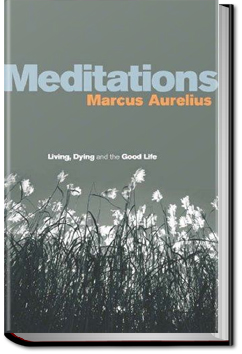Marcus Aurelius wrote Meditations in Greek while on campaign between 170 and 180, as a source for his own guidance and self-improvement. These memos survive and continue to inspire others to this day. These writings take the form of quotations varying in length from one sentence to long paragraphs. He explicates the Stoic philosophy that the only way a man can be harmed by others is to allow his reaction to overpower him. He shows no particular religious faith in his writings, but seems to believe that some sort of logical, benevolent force organizes the universe in such a way that even "bad" occurrences happen for the good of the whole.
p to think of myself; and by his respect and
love, delight and please me. That I have got ingenuous children, and
that they were not born distorted, nor with any other natural deformity.
That I was no great proficient in the study of rhetoric and poetry, and
of other faculties, which perchance I might have dwelt upon, if I had
found myself to go on in them with success. That I did by times prefer
those, by whom I was brought up, to such places and dignities, which
they seemed unto me most to desire; and that I did not put them off with
hope and expectation, that (since that they were yet but young) I would
do the same hereafter. That I ever knew Apollonius and Rusticus, and
Maximus. That I have had occasion often and effectually to consider and
meditate with myself, concerning that life which is according to nature,
what the nature and manner of it is: so that as for the gods and such
suggestions, helps and inspirations, as might be expected from them,
nothing did hinder, but that I might have begun long before to live
according to nature; or that even now that I was not yet partaker and
in present possession of that life, that I myself (in that I did not
observe those inward motions, and suggestions, yea and almost plain and
apparent instructions and admonitions of the gods,) was the only cause
of it. That my body in such a life, hath been able to hold out so long.
That I never had to do with Benedicta and Theodotus, yea and afterwards
when I fell into some fits of love, I was soon cured. That having been
often displeased with Rusticus, I never did him anything for which
afterwards I had occasion to repent. That it being so that my mother was
to die young, yet she lived with me all her latter years. That as often
as I had a purpose to help and succour any that either were poor, or
fallen into some present necessity, I never was answered by my officers
that there was not ready money enough to do it; and that I myself never
had occasion to



The Roman emperor Ma